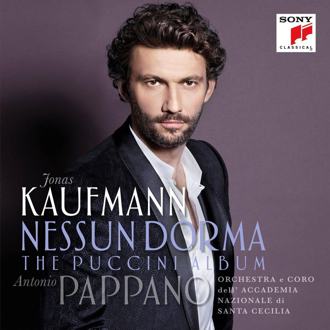
If you like good, smart singing, tenor Jonas Kaufmann’s Nessun Dorma: The
Puccini Album is for you.
Perhaps the most satisfying moments of
Andris Nelsons’s inaugural concert as Boston Symphony Orchestra (BSO) music
director last fall occurred during the three numbers for which tenor Jonas
Kaufmann joined Nelsons and his new ensemble. Then, in music by Wagner and
Puccini, Kaufmann’s voice, with its lustrous bronze tone, impeccable
diction, smart command of phrasing, and dramatic intelligence, was, at least
for me, the highlight of the night.
For those who weren’t able to be
there (or didn’t get to see the PBS broadcast of that concert), Kaufmann’s
new release on Sony Classical, Nessun Dorma: The Puccini Album, reprises a
pair of movements he sang that evening. It also adds a whole lot more:
arias, duets, and ensembles from all of Puccini’s operas (except the
all-female Suor Angelica), stylishly accompanied in each by Antonio Pappano
and the St. Cecilia Academy Orchestra and Chorus. If you like good, smart
singing, this disc is for you.
Kaufmann’s at his formidable best in
Puccini’s heroic roles. His “Donna non vidi mai” from Manon Lescaut opens
the disc beautifully, showcasing wide-eyed lyricism and a beautifully
balanced tone between Kaufmann’s upper- and middle-registers. Similarly,
“Torna ai felici di” from Le Villi is thrilling in its intensity and
bittersweet lyricism. Much the same can also be said for his reading of
“Orgia, chimera dall’occhio vitreo” from Edgar.
Kaufmann sings
“Recondita armonia,” Cavaradossi’s first aria from Tosca, with real warmth
and sweetness of voice. And, in “O soave fanciulla” from La Bohème,
Kaufmann’s Rodolfo carries the day, with singing that conveys such deep
feeling that it all but blows soprano Kristine Opolais’s Mimi out of the
water. Perhaps that’s a bit unfair: Opolais doesn’t really do anything
wrong—she sings her part straight and, toward the end (when both characters
move off-stage), begins to really match Kaufmann in focus and timbral
strength. But throughout, she seems to be holding back and a bit
self-conscious, which is a shame, since her account of this aria with
Kaufmann last September in Boston made for one of the most charming episodes
of her husband’s BSO debut program.
Opolais doesn’t leave a big
impression, either, in “Oh, sarò la piú bella!” from Manon, even though,
again, she sings it well enough. As in the Bohème excerpt, this is largely
because Kaufmann inhabits this repertoire so thoroughly and grandly: as a
general rule, he’s singing on a different plane than anybody else on this
disc. That goes, too, for Antonio Pirozzi’s appearances in Manon and Tosca
and for Massimo Simeoli’s brief turns in Madama Butterfly and La Fanciulla
del West. None are bad singers, per se; they’re just mostly outsung here.
That said, the Turandot excerpts—“Non piangere, Liu!” and eponymous
“Nessun dorma”—get a mighty treatment from all involved. In the latter,
Kaufmann’s voice isn’t anywhere near as brilliant-sounding as Pavarotti’s,
but he uses that fact to his advantage, really making the aria his own.
Opolais’s brief appearance as a sweet-voiced Liu works better here, as it
also does at the end of “Ah! Manon, mi tradisce” (the third of four Manon
excerpts) earlier on the disc.
Pappano and the orchestra accompany
everything with the brilliance you’d expect from an Italian orchestra and
conductor in this repertoire. The brass playing is particularly stentorian
in the short “Hai ben ragione” from Il tabarro, while winds and strings
bring dulcet color to “Parigi! É la città dei desideri” from La Rondine, and
the full ensemble shines in “Avette torto!” from Gianni Schicchi.
|